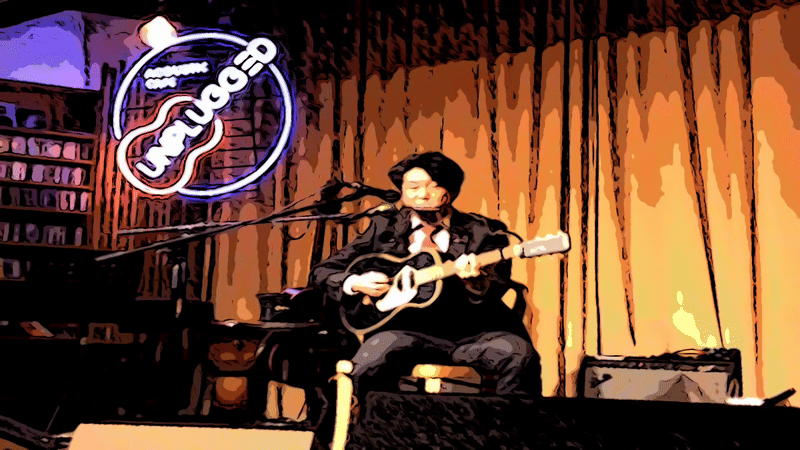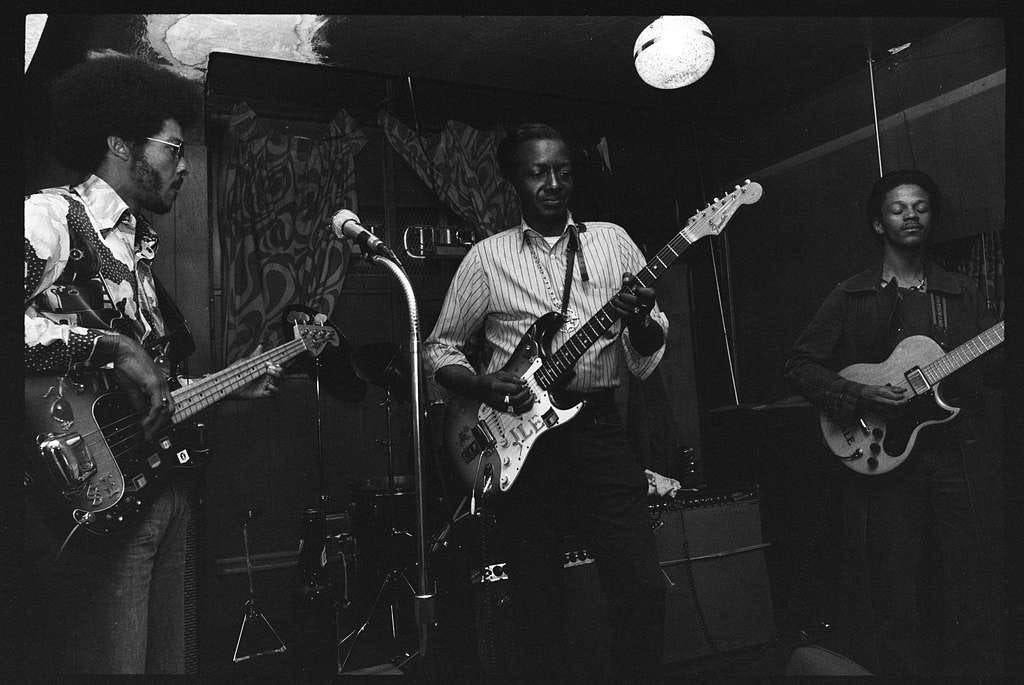Seedless Watermelon Kim Dae-joong (씨 없는 수박 김대중) Live
Bluesman Kim Dae-joong channels Chicago blues, talks modern-day folk and plugs his new health bar.
Seedless Watermelon Kim Dae-joong’s world is populated with budget motels, efficiency apartments, neighborhood bath houses, zero-balance bank accounts, dubious blankets, cheap soap, backaches, toothaches, his mother’s dentures and other less-than-ideal things that signal general misfortune and ailments.
They’re vivid props and backdrops to the anguished, hard up, down-on-his-luck tramp persona that the 46-year-old bluesman has crafted. In his tragicomic songs, he’s a bad son to his parents, a broke rental-seeker to his realtor, the lover of three months to a woman who’s four-months pregnant.
But he’s one of the greats to young musicians, including those who were on the bill with him for the Jan. 10 show at Unplugged in Seoul, where dozens had filed in for some homegrown blues. Folk duo Sanmanhan, whose set preceded Kim’s, called the bluesman onto the stage in awe and asked to sing a song together. Kim readily agreed but seemed rather bemused at their effusive reverence and repeated reference to him as “teacher.”

Dressed in a fitted charcoal suit with a tie the color of ripe watermelon flesh and a harmonica holder around his neck, Kim strummed a Gretsch guitar plugged into a portable Pignose amp that rendered the sound fuzzier than most acoustic guitars.
It was an intentional choice. He was channeling the electrified, urban blues originating from Maxwell Street in Chicago, where the famed bluesman Muddy Waters picked up an electric guitar, Kim later told me.
“I like the sound of that neighborhood and tried to copy it,” he said.
Since releasing his first album in 2013, Kim has put out several singles and participated in compilation albums. He’s not quite a household name, but he is a musician’s musician—or an indie musician’s musician to be more specific—whose work has joined the Korean blues canon.
On the internet, Kim’s discoverability suffers from having a more famous namesake: the former South Korean president Kim Dae-jung. The top search results might not be on his side, but the name has inspired jokes for the one-man act’s repertoire and even the title for a song called “Sunshine Policy” (햇볕정책), though it’s about a lovelorn man, not the former statesman’s approach towards North Korea for which he received a Nobel Peace Prize.
For the Friday-night show, Kim tested the mic with his best-known track, “Seedless Watermelon” (씨 없는 수박), a languorous earworm about being a seedless watermelon. In between tunes, he had a mellow demeanor. He seemed attuned to the cultural sensitivities of the times, apologizing after belting out lyrics that might not sit well with female audiences. “It’s an old song,” Kim said.
The two-hour show was named “Folk Talk” (which rhymes in Korean), so Kim briefly shared his meditations on folk:
“What is folk? It’s been a while since I’ve been asked that question. Is it folk if it’s played with an acoustic guitar? Is folk if there’s no drums, bass and electric guitar? I’ve been thinking about that for a long time. Folk music shouldn’t need a guitar. But in fact, there is no music like that. It seems primitive but there’s the kind of traditional music that’s clapped to and survives by being pass down orally. Should we call that folk? What is folk in this era? … But now blues is a type of folk music and has survived in the powerful form of 12 bars. … Songs have to survive to ultimately become folk.”
Other songs from the night’s set list included the more upbeat “300/30,” about a tight housing budget that only allows for cheap rooftop and basement apartments; “Denture Blues” (틀니 블루스), about inheriting bad teeth and his aging mother; and “Chungsong Chicken Joint” (청송닭집), about driving by a fried chicken joint and other stuff of life.
His music suggest he’s in pain emotionally and physically, but in real life he runs a health bar in Seoul. Healthy juices, teas and hangover drinks are among his offerings, concocted from various ingredients and medicinal herbs based on traditional practices from the Joseon dynasty. Before opening the business, Kim worked at a care home for 15 years as a licensed social worker, which inspired his song “Care Home Blues” (요양원 블루스).
“Now I have to write another song called ‘Health Bar Blues’ for my second album," he said to cheering crowds. “It’s been 12 years.”
Kim was also the subject of a 2014 documentary, where he says he followed a particular formula for blues musicians in coming up with his stage name. “The first name should be a disability, like Blind; then the middle name should be a fruit, and the last name, a president.” he says in the trailer. “That makes me Seedless Watermelon Kim Dae-joong — it’s perfect.”
The only other blues musician that I’ve been able to find who follows this formula is the American country blues singer Blind Lemon Jefferson.
Follow Seedless Watermelon Kim Dae-joong (씨 없는 수박 김대중) @keumho_health on Instagram.





